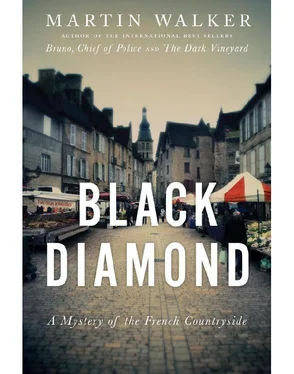Martin Walker - Black Diamond
Здесь есть возможность читать онлайн «Martin Walker - Black Diamond» весь текст электронной книги совершенно бесплатно (целиком полную версию без сокращений). В некоторых случаях можно слушать аудио, скачать через торрент в формате fb2 и присутствует краткое содержание. Жанр: Полицейский детектив, на английском языке. Описание произведения, (предисловие) а так же отзывы посетителей доступны на портале библиотеки ЛибКат.
- Название:Black Diamond
- Автор:
- Жанр:
- Год:неизвестен
- ISBN:нет данных
- Рейтинг книги:3 / 5. Голосов: 1
-
Избранное:Добавить в избранное
- Отзывы:
-
Ваша оценка:
- 60
- 1
- 2
- 3
- 4
- 5
Black Diamond: краткое содержание, описание и аннотация
Предлагаем к чтению аннотацию, описание, краткое содержание или предисловие (зависит от того, что написал сам автор книги «Black Diamond»). Если вы не нашли необходимую информацию о книге — напишите в комментариях, мы постараемся отыскать её.
Black Diamond — читать онлайн бесплатно полную книгу (весь текст) целиком
Ниже представлен текст книги, разбитый по страницам. Система сохранения места последней прочитанной страницы, позволяет с удобством читать онлайн бесплатно книгу «Black Diamond», без необходимости каждый раз заново искать на чём Вы остановились. Поставьте закладку, и сможете в любой момент перейти на страницу, на которой закончили чтение.
Интервал:
Закладка:
“You think young Pons is going to be the joint candidate?” Bruno asked.
“Not only that. I think he’s going to win,” said the baron, handing a sheet of paper across the table. Bruno found himself reading a printed appeal from Boniface Pons, owner of the old sawmill, to sign a petition to support his independent campaign to be the next mayor as candidate for the St. Denis Alliance for Jobs. “He only needs sixty signatures on that petition to get on the ballot, and he’ll get that from the sawmill employees and their families.”
“ ‘Ban all immigration so long as French workers remain unemployed,’ ” Bruno read aloud.
“So he gets the Front National vote, and a lot of the conservatives who usually vote for the mayor,” the baron said. “If the Reds and Greens put up a decent candidate, they could win. And I think they might just have one in the guy who bought us this bottle of champagne.”
“You think our mayor could lose?” Bruno asked. With young Pons heading that Red-Green list and his father running on the right, a lot of media attention could be guaranteed, Bruno thought. That would mean more work for him, trying to keep St. Denis calm during a heated campaign with TV cameras and reporters hunting for Oedipal drama as father faced son on the hustings. If the mayor lost, it might well be his final task as the chief of police of St. Denis.
“Voters get tired of the same old face. And there’s a recession. And young Pons is a fresh new political face with some new ideas. Yes, I think our old friend could lose.”
Bruno handed back the paper and looked across to the table where Alphonse and Marillon were raising a glass to each other. They could have been sealing a pact. The baron followed his gaze.
“Would anybody mind if we treat this like a Chinese restaurant and share one another’s dishes?” asked Pamela. Startled, Bruno turned his attention back to the table.
“Sure, good idea,” said Fabiola as Bill approached the table to take their orders.
“Tell me about this Pekin-Perigord duck on the menu,” the baron said.
“It’s like the usual Pekin duck, wrapped in a crepe with strips of cucumber and spring onions,” Bill explained. “But instead of hoisin sauce we use a reduction of vin de noix, and the ducks are from here, but we wind-dry them in the Chinese way. My chef, Minxin, says he can’t wait to try it back in Hong Kong.” He poured the remainder of the champagne.
“I’m pleased you’re having the risotto. It’s an attempt to do with our truffles here what they do in Piedmont with white truffles,” Bill went on, when Fabiola told him her choice. “And there’s an organic sauvignon blanc from a small vineyard near Thenac that goes wonderfully well with it, and with the duck.”
The baron chose the duck and the white wine and as usual asked for a carafe of tap water. The price that restaurants charged for mineral water was one of his standard grumbles. His dinner companions were used to his ways. The four of them had eaten and played tennis together often enough to be comfortable in one another’s company. Only when they were alone did the baron tease Bruno about his relationship with Pamela, saying how much more suited he was to her than Isabelle, the dashing police inspector from Paris with whom he’d enjoyed a brief but passionate affair that summer. When you get to my age, the baron had said, you’ll know that it’s better to be suited to a woman than to be besotted with her.
Looking across the table at Pamela’s perfect complexion and lively eyes, and feeling the soft pressure of her foot resting on his beneath the table, Bruno knew that he was more than a little besotted with her, possibly because their affair had begun just a few weeks ago. And Bruno was still trying to adapt to the rhythms that Pamela imposed. He was accustomed to a blaze of passion, spending each night with a new lover and plunging into the relationship as if he were diving headlong into a river. As loving as she might be when they were together, that was not Pamela’s way. She made it clear when he was welcome in her bed and when he was not. When she wanted a weekend to herself she told him so with firm affection, and she never spoke of their future. It was a very controlled affair, and she insisted on their living separate lives. She said it was because she did not want to become a subject of St. Denis gossip, which just showed how little she understood the way a small town comes to know things by a kind of osmosis. She’d talked of her failed marriage back in England and told him she was wary of living with a man. She remained elusive and something of a mystery to him, and Bruno was sufficiently honest with himself to admit that was part of her attraction.
They all shared the baron’s duck, and then Pamela took command of the table, passing around spoonfuls of her gado-gado salad, described on the menu as an Indonesian dish of bean sprouts with a peanut sauce. She quartered her trout to serve it around the table, and even the baron nodded approvingly at the lemongrass sauce. The wine was pronounced perfect, and all the dishes were empty by the time the young waitress returned with the Pruneaux d’Agen soaked in brandy.
“I think I’ll become a regular here, even though they didn’t get the risotto quite right,” said Fabiola. Murmurs of satisfied approval around the table made it clear she spoke for them all. The baron was nodding happily as he signaled for the bill. But before it came, Pons ambled over, bringing a tray with four small pottery cups and a stone bottle so cold that beads of moisture sparkled and ran down the sides.
“This is something special I’d like you to try,” he said. “We offer it to all our guests on their first visit. It’s called mijiu. It’s a Chinese rice wine that’s usually drunk warm. But I find it makes a fine digestif served very cold.”
“How long were you in China?” Pamela asked. “And why don’t you come and join us? Most of your other guests have gone.” She waved a hand at the almost empty restaurant.
“I’d like that,” Bill said, pulling up a chair between Pamela and the baron. “I lived in Hong Kong and Macao for nearly ten years, but with lots of trips to the mainland. I was in Shanghai for nearly a year, Beijing for a few months. And I spent time in Singapore and Bangkok. I loved Asia. Still do, but suddenly I started to feel a little homesick. Believe it or not, I hoped for a reconciliation with my father.”
“But you weren’t prepared to compromise on the sawmill,” said the baron, “despite the family tie.”
“No. But I offered to help pay for a new chimney scrubber.”
“The latest problem was less the pollution than the location,” said Bruno. “It was too close to that housing block.”
“It would have meant demolishing one building,” said Pons, with a bitter laugh. “Just a small storage shed, and donating about a hundred square meters to the commune. Then the sawmill would’ve been outside the excluded area. I offered to pay for the land and for a replacement storage building, but my father saw it as a matter of principle. Or perhaps he saw it as good business-he’s getting a generous grant to build the new sawmill over in St. Felix and a tax write-off for the old place. Anyway, he made it pretty clear that he wanted neither my help nor my company. But that’s enough about my dysfunctional family. Thanks again, especially to you, Monsieur le Chef de Police. I’d heard all about you from our mutual friend Alphonse, and I think it was mainly thanks to you that it didn’t turn out worse than it was.”
“If violence breaks out, even one brief incident, it means I’ve failed,” said Bruno, feeling uncomfortable. “I can’t count that as one of my better days.”
“Let’s try this Chinese wine,” Pamela said into the sudden silence.
Читать дальшеИнтервал:
Закладка:
Похожие книги на «Black Diamond»
Представляем Вашему вниманию похожие книги на «Black Diamond» списком для выбора. Мы отобрали схожую по названию и смыслу литературу в надежде предоставить читателям больше вариантов отыскать новые, интересные, ещё непрочитанные произведения.
Обсуждение, отзывы о книге «Black Diamond» и просто собственные мнения читателей. Оставьте ваши комментарии, напишите, что Вы думаете о произведении, его смысле или главных героях. Укажите что конкретно понравилось, а что нет, и почему Вы так считаете.












